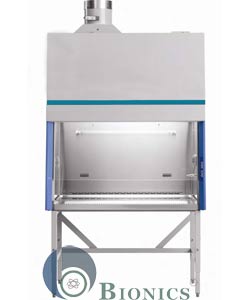Don't Fall to Class 2 Biosafety Cabinets Blindly, Read This Article
Don't Fall to Class 2 Biosafety Cabinets Blindly, Read This Article
Blog Article
Class 2 Biosafety Cabinets – Vital for Lab Safety and Biological Containment

In today’s scientific and clinical labs, safety for personnel and samples is non-negotiable. Whether it's conducting biological tests, diagnostics, or experiments with infectious agents, biosafety cabinets form the backbone of contamination control.
Class 2 Biosafety Cabinets are widely adopted for offering three-way protection. These units are essential for labs working with infectious materials or clinical diagnostics.
Understanding Biosafety Cabinets
Biosafety cabinets are ventilated enclosures built to protect both users and biological materials. They use HEPA filtration to remove contaminants from incoming and outgoing air.
These units are generally classified into three categories—Class I, Class II, and Class III. Among these, Class II units strike a balance between user, product, and environmental protection.
What Are Class 2 Biosafety Cabinets?
Class 2 Biosafety Cabinets ensure safety on all fronts—personnel, workspace, and biological material. They generate a vertical airflow that reduces turbulence and contamination.
Both incoming and outgoing air are HEPA-filtered to maintain sterility and prevent leaks. These cabinets are ideal for work involving moderate-risk pathogens (BSL-2/3).
Essential Features of Class 2 Safety Cabinets
A Class 2 microbiological safety cabinet includes several integrated safety mechanisms such as:
• HEPA/ULPA filtration to trap microbes and particles
• Laminar airflow that minimises disruption and contamination
• Pressure differentials that maintain internal containment
• Built-in UV sterilisation for decontaminating surfaces
• Low sound Biosafety Cabinets emissions to reduce fatigue
• Clear front panel for visibility and safety
These elements create a clean, contained, and user-friendly workspace.
Applications in Research and Healthcare
Class 2 Biosafety Cabinets are key equipment in healthcare, molecular biology, and quality control. They are critical for DNA/RNA extraction, pathogen culture, and molecular assays.
Whether in hospitals or drug manufacturing, these units are essential for clean procedures.
Benefits of Using Class 2 Biosafety Cabinets
Using Class 2 cabinets offers significant improvements in contamination control and user safety:
• Protects the integrity of lab work
• Acts as a barrier between user and biohazard
• Improves environmental safety by filtering outgoing air
These cabinets help labs meet safety regulations while maintaining workflow.
Regulatory Standards for Class 2 Cabinets
Top manufacturers ensure their cabinets meet certifications like NSF 49, EN 12469, and WHO recommendations. Class 2 units are sub-classified as A1, A2, B1, and B2—based on varying airflow balance and ducting needs.
• Type A2: Most commonly used cabinet model
• Type B2: Suited for labs dealing with toxic agents
Matching the cabinet type to your process is essential.
Tips for Purchasing the Ideal Biosafety Cabinet
Before purchasing, consider:
• The biosafety level required (BSL-1, BSL-2, or BSL-3)
• Available lab space and utility infrastructure
• Ease of use, energy efficiency, and upkeep
• Manufacturer reputation and post-sale support
Working with reliable manufacturers provides peace of mind and technical guidance.
Installation and Safety Guidelines
For optimal results:
• Minimise airflow interference during operation
• Ensure annual certification and airflow testing
• Educate staff on cabinet operations and safety
Operational best practices include:
• Maintain biosafety gear protocols
• Minimise hand movements inside the cabinet
• Decontaminate surfaces before and after use
• Never activate UV when humans are present
Final Thoughts on Class 2 Biosafety Cabinets
Class 2 biosafety cabinets are essential for labs that value safety, precision, and cleanliness. They protect workers, secure samples, and copyright environmental standards.
From biotech and diagnostics to academia and pharma, Class II cabinets maintain sterility in sensitive procedures. When investing in a biosafety cabinet, choose performance and reliability over cost-cutting—because safe science starts with smart containment. Report this page